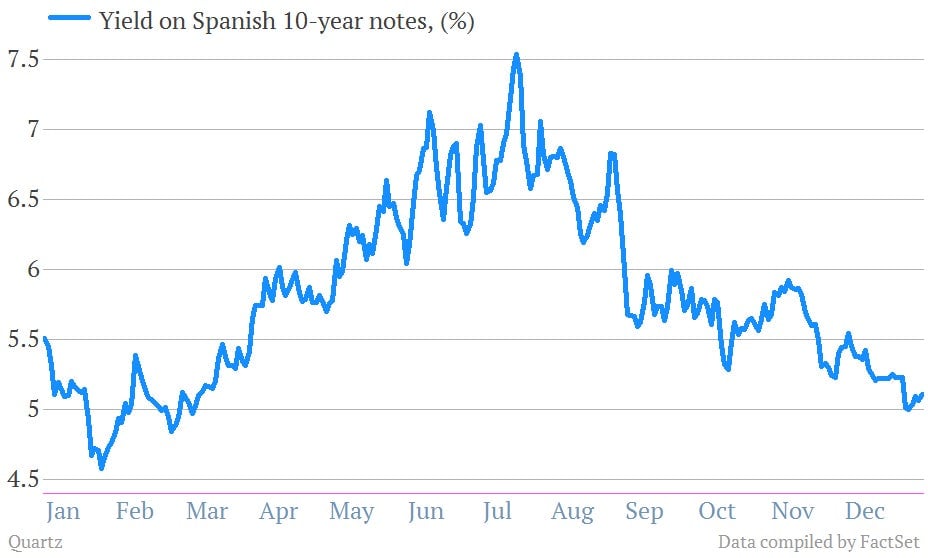ECB leaves rates alone, spreading warm and fuzzy feelings in the euro zone
The European Central Bank’s (ECB) decision today to leave its benchmark rate unchanged at 0.75% was widely expected, but it nonetheless sent soothing signals to the frayed nerves of the euro zone. As if on cue, yields on Spain’s 10-year government bond fell to 4.94% on Thursday, the lowest level in 10 months, suggesting renewed confidence in its bond market. Meanwhile, the Bank of England also left its key lending rate unchanged at a record low of 0.5%.


The European Central Bank’s (ECB) decision today to leave its benchmark rate unchanged at 0.75% was widely expected, but it nonetheless sent soothing signals to the frayed nerves of the euro zone. As if on cue, yields on Spain’s 10-year government bond fell to 4.94% on Thursday, the lowest level in 10 months, suggesting renewed confidence in its bond market. Meanwhile, the Bank of England also left its key lending rate unchanged at a record low of 0.5%.
Other market reactions to the two key central bank decisions were mixed: the Stoxx Europe 600 index was slightly down (though that was after reaching a high the day before that had not been seen since Feb. 2011), the euro went up against the dollar and the yen, and UK bonds remained steady (paywall).
The fact that the ECB didn’t feel the need to lower its rate, economists noted, reflects the calm markets have already derived from its declaration last year that it essentially stands ready to buy bonds from troubled euro zone countries like Spain and Italy—the Outright Monetary Transaction (OMT) program—even though it hasn’t actually bought any. Yields for these countries’ bonds have fallen a good deal in recent months, which means demand for them is higher (yields and prices move in opposite directions). Here’s a look at the yield on Spanish 10-year government bonds, a widely watched gauge of government borrowing costs.

In a recent report, JP Morgan economists said the ECB’s announcement of OMT in September helped shore up confidence, not only in governments, but also in the banks, which have massive holdings of government bonds. The hope is that this will lead to lower borrowing costs for other players in the economy. “In the coming months, it will be important that these improvements lead to a stabilization in bank lending standards and to a fall in the interest rates that banks charge on new loans to households and corporates,” the report says.
Still, the worst of the euro crisis may not be over. The coming year remains filled with uncertainty, with an ongoing recession across the 17-country currency bloc, unemployment at record levels, and even usually reliable Germany battling weaker demand from euro zone countries and seeing its exports start to falter.
Indeed, some experts have suggested that with dysfunctional elections expected in Italy, a likely bailout in Cyprus (and possibly one in Spain too), ongoing turmoil in Greece, and a big German election, 2013 could make the stormy days of 2012 look tranquil by comparison.